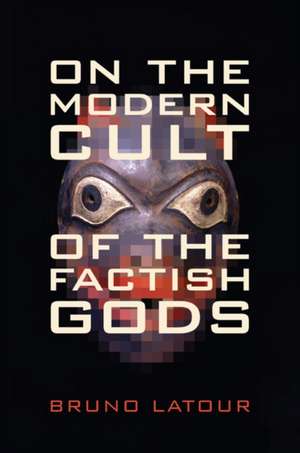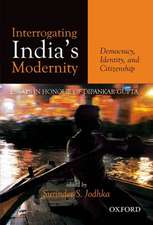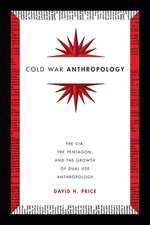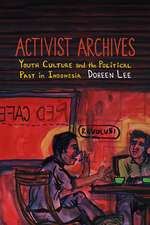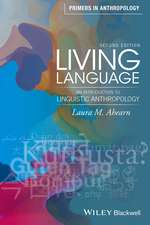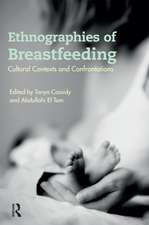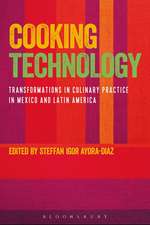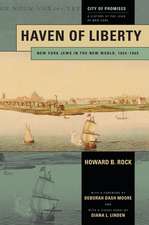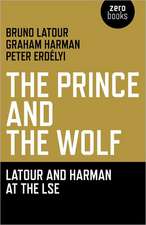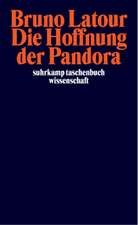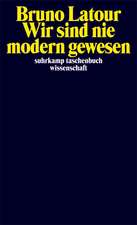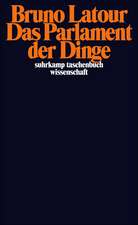On the Modern Cult of the Factish Gods: Science and Cultural Theory
Autor Bruno Latouren Limba Engleză Paperback – 27 dec 2010
Preț: 158.25 lei
Nou
Puncte Express: 237
Preț estimativ în valută:
30.29€ • 32.91$ • 25.46£
30.29€ • 32.91$ • 25.46£
Carte disponibilă
Livrare economică 31 martie-14 aprilie
Livrare express 15-21 martie pentru 20.44 lei
Preluare comenzi: 021 569.72.76
Specificații
ISBN-13: 9780822348252
ISBN-10: 082234825X
Pagini: 168
Ilustrații: 4 illustrations
Dimensiuni: 167 x 227 x 11 mm
Greutate: 0.25 kg
Editura: MD – Duke University Press
Seria Science and Cultural Theory
ISBN-10: 082234825X
Pagini: 168
Ilustrații: 4 illustrations
Dimensiuni: 167 x 227 x 11 mm
Greutate: 0.25 kg
Editura: MD – Duke University Press
Seria Science and Cultural Theory
Cuprins
PrefaceOne: On the Cult of Factish Gods; Two: Iconoclash; Three: Thou Shalt Not Freeze FrameNotes; Index
Recenzii
"Latour came into view in the 1980s as an uncommonly engaging as well as radical practitioner of the new discipline of science studies.... witty, imaginative, literate and unrelentingly ironic. For some, all this spells something manifestly frivolous and naturally suspect. Others, including many not ordinarily drawn to treatises on science and technology, are attracted by Latours style into engaging with ideas they find illuminating and a mode of analysis they can use. - Barbara Herrnstein Smith, London Review of Books, March 8th 2012
"What immense spiritual and intellectual relaxation! With what vivacity and cunning Bruno Latour gets us out of the cage holding us hostage of the mumbo-jumbo of Subjects and Objects all these long years of Western Civ. Out-fetishizing these fetishes, nudging us towards the mastery of non-mastery, he invites us thereby to the sort of thinking needed to remake a failing world.--Michael Taussig, Columbia University
"Bruno Latours is a joyous and generous science, not a warmongering, invidious one. His unique intellectual trajectory beautifully replicates those strange objects he was the first to fully discern. For his work is eminently suitable to an actor-network treatment; it thrives on associations; it deals in mediations; it articulates heterogeneous modes of existence; it modulates its own regime of enunciation as the truth it describes changes its own conditions of production. What started as a social description of scientific practice morphed into a radical redescription of the social at least as much as of science itself, and it bloomed as a daring project of a general anthropology of truth, within which facts and fetishes, divine forces and material forms, art and science, religion and law, all are made to inhabit a virtual plane of coexistence, which we are challengingly invited to bring into actuality as our common world.--Eduardo Viveiros de Castro, Museu Nacional (Rio de Janeiro)
"Eloquent, amusing and fabulously well-informed, Bruno Latour is one of the superstars of French intellectual life.... His recent book On the Modern Cult of the Factish Gods shows that Latour remains a great star, even if he has been through some kind of midlife crisis about the work that made him famous.... he also grapples for the first time with a problem that has always haunted the philosophy of science: the question of religious belief. "Any change in the way science is considered, he observes, "will have some consequences on the many ways to talk about religion. There is of course a hoary orthodoxy which maintains that the rise of science annihilates religion just as the dawning of day dispels the darkness of night. ¬ - Johnathan Rée, New Humanist, July 2012
"Latour came into view in the 1980s as an uncommonly engaging as well as radical practitioner of the new discipline of science studies... witty, imaginative, literate and unrelentingly ironic. For some, all this spells something manifestly frivolous and naturally suspect. Others, including many not ordinarily drawn to treatises on science and technology, are attracted by Latour's style into engaging with ideas they find illuminating and a mode of analysis they can use." - Barbara Herrnstein Smith, London Review of Books, March 8th 2012 "What immense spiritual and intellectual relaxation! With what vivacity and cunning Bruno Latour gets us out of the cage holding us hostage of the mumbo-jumbo of Subjects and Objects all these long years of Western Civ. Out-fetishizing these fetishes, nudging us towards the mastery of non-mastery, he invites us thereby to the sort of thinking needed to remake a failing world."--Michael Taussig, Columbia University "Bruno Latour's is a joyous and generous science, not a warmongering, invidious one. His unique intellectual trajectory beautifully replicates those strange objects he was the first to fully discern. For his work is eminently suitable to an actor-network treatment; it thrives on associations; it deals in mediations; it articulates heterogeneous modes of existence; it modulates its own regime of enunciation as the truth it describes changes its own conditions of production. What started as a 'social description of scientific practice' morphed into a radical redescription of the social at least as much as of science itself, and it bloomed as a daring project of a general anthropology of truth, within which facts and fetishes, divine forces and material forms, art and science, religion and law, all are made to inhabit a virtual plane of coexistence, which we are challengingly invited to bring into actuality as our common world."--Eduardo Viveiros de Castro, Museu Nacional (Rio de Janeiro) "Eloquent, amusing and fabulously well-informed, Bruno Latour is one of the superstars of French intellectual life... His recent book On the Modern Cult of the Factish Gods shows that Latour remains a great star, even if he has been through some kind of midlife crisis about the work that made him famous... he also grapples for the first time with a problem that has always haunted the philosophy of science: the question of religious belief. "Any change in the way science is considered," he observes, "will have some consequences on the many ways to talk about religion." There is of course a hoary orthodoxy which maintains that the rise of science annihilates religion just as the dawning of day dispels the darkness of night." - Johnathan Ree, New Humanist, July 2012
"What immense spiritual and intellectual relaxation! With what vivacity and cunning Bruno Latour gets us out of the cage holding us hostage of the mumbo-jumbo of Subjects and Objects all these long years of Western Civ. Out-fetishizing these fetishes, nudging us towards the mastery of non-mastery, he invites us thereby to the sort of thinking needed to remake a failing world.--Michael Taussig, Columbia University
"Bruno Latours is a joyous and generous science, not a warmongering, invidious one. His unique intellectual trajectory beautifully replicates those strange objects he was the first to fully discern. For his work is eminently suitable to an actor-network treatment; it thrives on associations; it deals in mediations; it articulates heterogeneous modes of existence; it modulates its own regime of enunciation as the truth it describes changes its own conditions of production. What started as a social description of scientific practice morphed into a radical redescription of the social at least as much as of science itself, and it bloomed as a daring project of a general anthropology of truth, within which facts and fetishes, divine forces and material forms, art and science, religion and law, all are made to inhabit a virtual plane of coexistence, which we are challengingly invited to bring into actuality as our common world.--Eduardo Viveiros de Castro, Museu Nacional (Rio de Janeiro)
"Eloquent, amusing and fabulously well-informed, Bruno Latour is one of the superstars of French intellectual life.... His recent book On the Modern Cult of the Factish Gods shows that Latour remains a great star, even if he has been through some kind of midlife crisis about the work that made him famous.... he also grapples for the first time with a problem that has always haunted the philosophy of science: the question of religious belief. "Any change in the way science is considered, he observes, "will have some consequences on the many ways to talk about religion. There is of course a hoary orthodoxy which maintains that the rise of science annihilates religion just as the dawning of day dispels the darkness of night. ¬ - Johnathan Rée, New Humanist, July 2012
"Latour came into view in the 1980s as an uncommonly engaging as well as radical practitioner of the new discipline of science studies... witty, imaginative, literate and unrelentingly ironic. For some, all this spells something manifestly frivolous and naturally suspect. Others, including many not ordinarily drawn to treatises on science and technology, are attracted by Latour's style into engaging with ideas they find illuminating and a mode of analysis they can use." - Barbara Herrnstein Smith, London Review of Books, March 8th 2012 "What immense spiritual and intellectual relaxation! With what vivacity and cunning Bruno Latour gets us out of the cage holding us hostage of the mumbo-jumbo of Subjects and Objects all these long years of Western Civ. Out-fetishizing these fetishes, nudging us towards the mastery of non-mastery, he invites us thereby to the sort of thinking needed to remake a failing world."--Michael Taussig, Columbia University "Bruno Latour's is a joyous and generous science, not a warmongering, invidious one. His unique intellectual trajectory beautifully replicates those strange objects he was the first to fully discern. For his work is eminently suitable to an actor-network treatment; it thrives on associations; it deals in mediations; it articulates heterogeneous modes of existence; it modulates its own regime of enunciation as the truth it describes changes its own conditions of production. What started as a 'social description of scientific practice' morphed into a radical redescription of the social at least as much as of science itself, and it bloomed as a daring project of a general anthropology of truth, within which facts and fetishes, divine forces and material forms, art and science, religion and law, all are made to inhabit a virtual plane of coexistence, which we are challengingly invited to bring into actuality as our common world."--Eduardo Viveiros de Castro, Museu Nacional (Rio de Janeiro) "Eloquent, amusing and fabulously well-informed, Bruno Latour is one of the superstars of French intellectual life... His recent book On the Modern Cult of the Factish Gods shows that Latour remains a great star, even if he has been through some kind of midlife crisis about the work that made him famous... he also grapples for the first time with a problem that has always haunted the philosophy of science: the question of religious belief. "Any change in the way science is considered," he observes, "will have some consequences on the many ways to talk about religion." There is of course a hoary orthodoxy which maintains that the rise of science annihilates religion just as the dawning of day dispels the darkness of night." - Johnathan Ree, New Humanist, July 2012
Notă biografică
Textul de pe ultima copertă
"Bruno Latour's is a joyous and generous science, not a warmongering, invidious one. His unique intellectual trajectory beautifully replicates those strange objects he was the first fully to discern. A spontaneous reflexivity, an iconic quality of its own. For his work is eminently suitable to an actor-network treatment; it thrives on associations, it deals in mediations; it articulates heterogeneous modes of existence; it modulates its own regime of enunciation as the truth it describes changes its own conditions of production. What started as a 'social description of scientific practice' morphed into a radical redescription of the social at least as much as of science itself, and it broke into bloom as a daring project of a general anthropology of truth, within which facts and fetishes, divine forces and material forms, art and science, religion and law, all are made to inhabit a virtual plane of coexistence which we are challengingly invited to bring into actuality as our common world."--Eduardo Viveiros de Castro, Museu Nacional (Rio de Janeiro)
Descriere
One of the leading figures in science studies offers a provocative look at the way science shatters the "fetishes" of magic and religion only to recreate other sorts of fetishes (factishes) in their place
